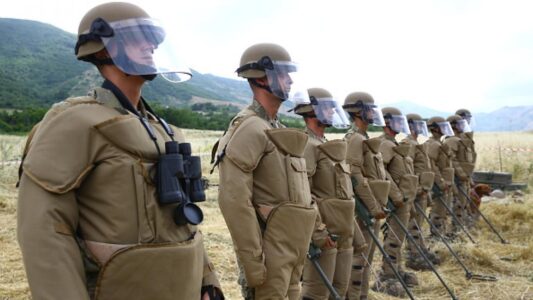
Fears for new Nagorno-Karabakh crisis as Azerbaijan threatens key road link
Increasingly fiery rhetoric and daily reports of clashes along the tense line of contact around Nagorno-Karabakh have sparked fears of a new conflict over the only remaining road link connecting the breakaway region to the outside world.
The Lachin Corridor, which connects Karabakh to Armenia through a sliver of Azerbaijani-controlled territory, has been under the supervision of Russian peacekeepers since the 2020 war.
Azerbaijan now is accusing Armenians of using the highway to transport weapons and other materiel in contravention of the terms of the ceasefire agreement that ended the 2020 war.
“The corridor is not being used for its intended purpose and this must be stopped,” Azerbaijan Foreign Minister Jeyhun Bayramov told journalists on November 25. He claimed that Baku had evidence that landmines manufactured in 2021 had been shipped from Yerevan to the region in recent months.
Armenia has denied the accusations; Ambassador-at-large Edmon Marukyan said that the allegations amounted to a pretext to “create false grounds to dispute [the] Lachin Corridor.”
The Russia-brokered 2020 ceasefire agreement required the Karabakh Armenians to give up the previous version of the Lachin Corridor, which had linked their isolated community to Armenia, as well as several towns and villages along it. In its place a new route that runs further south, largely constructed by Azerbaijani workers, opened to traffic in August.
But as Azerbaijan seeks to push Armenia into a comprehensive peace agreement, it is continuing to exert military pressure on Armenians as it calls into question the Lachin Corridor. The recent increase in tension has again raised fears that a new escalation could be in the cards.
Over the past few weeks, there has been a sharp spike in the number of ceasefire violations reported by both Armenia and Azerbaijan, with Baku repeatedly claiming over the course of several consecutive days that its troops had come under fire from “illegal armed detachments” in Nagorno-Karabakh. The Armenian Karabakh armed forces, known as the Artsakh Defense Army, have called the claims “disinformation” and Russian peacekeepers have reported that it is in fact Azerbaijani forces who have been violating the ceasefire.
Baku has called on all ethnic Armenian forces in Nagorno-Karabakh to disband, while locals fear that if they do, Azerbaijani troops will move in and they could be displaced from their homes – or worse.
Azerbaijan President Ilham Aliyev has repeatedly expressed frustration that the Lachin Corridor remains open while Yerevan refuses to allow it to use a 35-kilometer stretch of land in the south of Armenia connecting mainland Azerbaijan and its exclave of Nakhchivan. Baku insists that what it calls the “Zangezur Corridor” was agreed as part of the deal that ended the 2020 war and that Armenia has been dragging its feet on implementation; for its part Yerevan argues it only has an obligation to reopen its border to vehicle traffic from the neighboring country.
“The Zangezur Corridor is the responsibility of Armenia,” Aliyev said during a speech in early November. “For two years, we have not been interfering with the cars moving from Armenia to Karabakh and in the opposite direction along the Lachin road… How much longer are we supposed to wait?” In recent days, negotiations appear to have broken down, and Aliyev has revealed he is holding talks with Moscow instead of Yerevan on the issue, describing Armenia as a Russian “satellite country” whose independence is merely “symbolic.”
Meanwhile, a rift has opened up between the Kremlin and Armenia after an Azerbaijani offensive in September and the refusal of the Russia-led Collective Security Treaty Organization (CSTO) to intervene on Armenia’s behalf.
At a summit in Yerevan on November 24 and 25, members of the organization failed to agree on an action plan to resolve the conflict after Armenian Prime Minister Nikol Pashinyan refused to sign off on its proposals. Instead, Armenia has increasingly been seeking support from the United States and Europe. And Aliyev on November 25 abruptly canceled a European Union-brokered meeting with Pashinyan over the proposed involvement of French President Emmanuel Macron.
Baku is not prepared to wait indefinitely on its demands for the handover of the Zangezur Corridor and the disbanding of Karabakh Armenian forces, a senior Azerbaijani official told Eurasianet. “Diplomatic options have almost been exhausted,” the official said on condition of anonymity. “What if we were to install a [border] post at the entrance of Lachin and finish the whole process? How can you breathe with no air?”
In Stepanakert, the de facto capital of the unrecognized state of Artsakh, concern is growing over the prospect of Baku limiting movement to and from the region. “Everybody is waiting for a new escalation,” Tigran Grigoryan, an Armenia-based political analyst, told Eurasianet. The precarious transport link is “not just a vulnerability but an existential threat,” he said. “If Azerbaijan has any kind of control or presence on the Lachin Corridor, the majority of the population will question the possibility of staying because that is the only road connecting Nagorno-Karabakh to the outside world.”
Speaking at a cabinet meeting earlier in November, Pashinyan warned that Aliyev’s rhetoric represented an attempt “to create grounds, invented grounds, for closing the Lachin Corridor, surrounding the Nagorno-Karabakh Armenians, and subjecting them to genocide and expatriation, under the pretext of Armenia not fulfilling its obligations.”
Across the border, the prospect of another conflict looms large as well. “We have really seen a deterioration of the situation over the past month,” Vasif Huseynov, head of department at the Azerbaijani state-run think tank Center of Analysis of International Relations. “According to the trilateral statement, the Lachin Corridor can be used only for humanitarian purposes. The violation of this makes Azerbaijan use various instruments under its disposal to stop illegal use of the corridor by Armenians,” he adds. “With the interference of external actors like Macron and Russia, and the breakdown in diplomacy, all this suggests that new escalations unfortunately cannot be excluded.”
Source: Eurasianet





